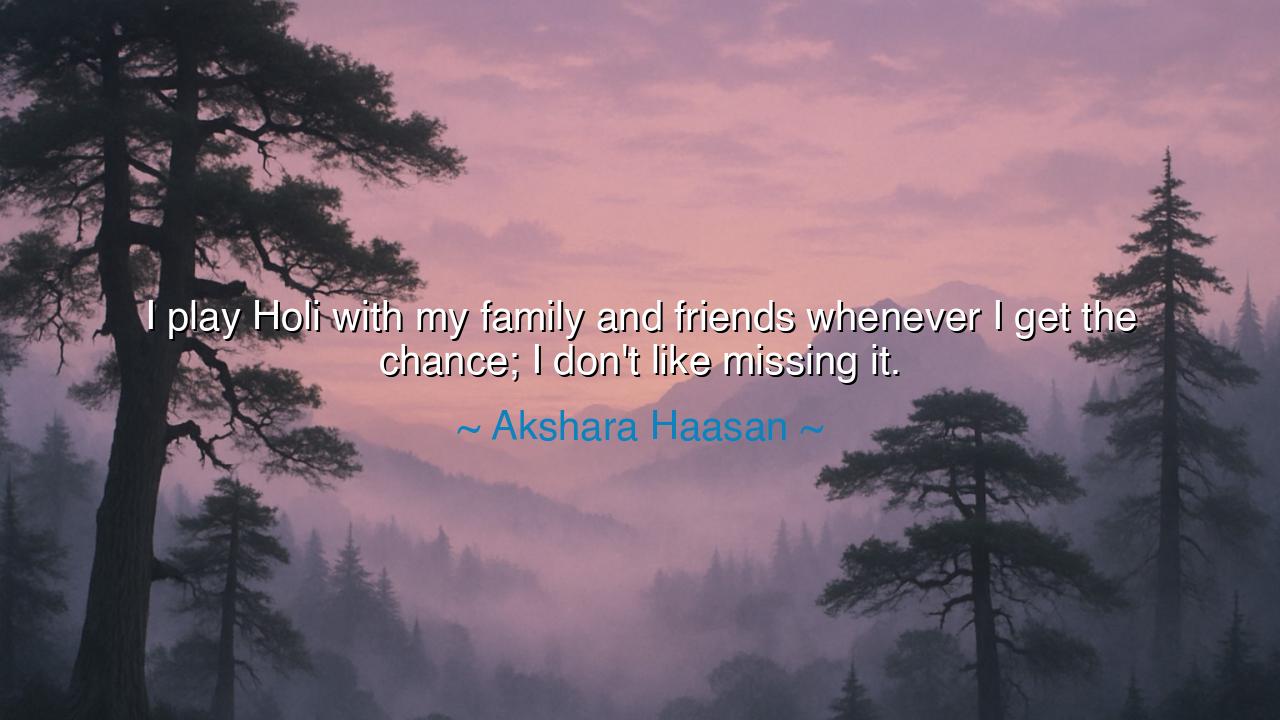
I play Holi with my family and friends whenever I get the chance;
I play Holi with my family and friends whenever I get the chance; I don't like missing it.






In the heartfelt words of Akshara Haasan, "I play Holi with my family and friends whenever I get the chance; I don't like missing it," we are offered a glimpse into the joy and cultural richness of the ancient festival of Holi, and more deeply, into the universal value of celebration and connection. Holi, the festival of colors, is not merely a day of play but a sacred ritual that binds people together, transcending barriers of age, caste, and creed. It is a celebration of life and renewal, a time when the old is left behind, and the new is embraced with open arms. Haasan's personal commitment to participating in this festival whenever possible reveals the importance of such celebrations in maintaining the bonds that tie us to our families, communities, and our heritage.
The importance of celebration and ritual is echoed throughout the ancient world. In Greek mythology, festivals were not just moments of leisure, but sacred times when people honored their gods and sought to renew their connection with the divine. The Olympic Games, for instance, were not just athletic contests, but a celebration of unity, where even the most divided city-states of Greece put aside their differences to compete in a spirit of camaraderie. Similarly, Holi serves as an opportunity for the people of India to come together, to celebrate the divine forces of nature, and to rejuvenate their spirits. Haasan’s words reflect the importance of these moments in life—times when we come together to share in the beauty of shared experiences and the joy of simply being alive.
Consider the story of Rome’s Saturnalia, the ancient festival that marked the end of the harvest and honored Saturn, the god of agriculture and abundance. During Saturnalia, societal norms were temporarily overturned: masters would serve their slaves, and traditional hierarchies would be suspended in favor of feasting and carnival-like revelry. It was a time of communal joy, of breaking down barriers, and celebrating the renewal of life and community. Similarly, Holi serves to wash away the old and embrace the new, allowing for a fresh start in relationships, attitudes, and the spirit. Just as the Romans found respite in Saturnalia, so too do we find joy and rejuvenation in the festival of Holi.
In the modern world, the story of Mahatma Gandhi offers another example of the power of celebration and connection in overcoming adversity. Gandhi, though deeply committed to nonviolence and political change, recognized the power of festivals in shaping collective identity. He often participated in cultural events, recognizing their role in fostering unity and strengthening the spirit of the people. For Gandhi, these moments of shared joy were not just distractions, but vital to the well-being of the individual and the nation. In much the same way, Haasan’s commitment to playing Holi reflects the understanding that rituals and celebrations are an essential part of maintaining balance in our lives and ensuring that we remain connected to the deeper rhythms of the human spirit.
The significance of Holi is not just in the colors that are thrown or the songs that are sung, but in the unity that it fosters. For the ancients, whether in the festivals of Greece, Rome, or India, the shared act of coming together in celebration was a reminder that life, at its core, is about community. In Holi, as in the festivals of old, we are reminded of the joy that comes from embracing each other, from sharing in the simple act of living together. Haasan’s words, though personal, speak to a universal truth: the act of celebrating with those we love is a renewing force—it strengthens our ties, lifts our spirits, and reminds us that life is not merely to be endured, but to be celebrated.
The lesson here is profound: we must celebrate not just the grand moments in life, but also the simple and communal ones. Like Haasan, who finds joy in playing Holi with her loved ones, we too must recognize the importance of shared experiences in building lasting relationships. Celebrations, rituals, and communal gatherings offer us the chance to pause, to renew our connections, and to embrace the joy that binds us together. These moments are not to be missed, for they remind us of the deep connections that hold our world together.
Therefore, in our own lives, let us make time for the simple joys of community and celebration. Let us cherish the moments that allow us to connect with others and with ourselves. Just as Holi is a time to cleanse and rejuvenate, let us take time to refresh our spirits and renew our bonds with those we hold dear. Whether through family gatherings, festivals, or small moments of shared happiness, we must never underestimate the power of celebration to bring about unity, renewal, and the joy of being alive.






AAdministratorAdministrator
Welcome, honored guests. Please leave a comment, we will respond soon